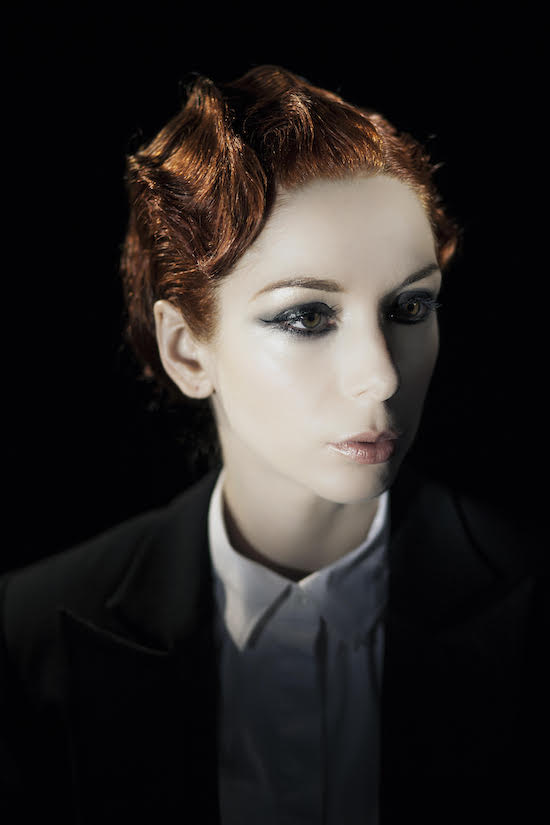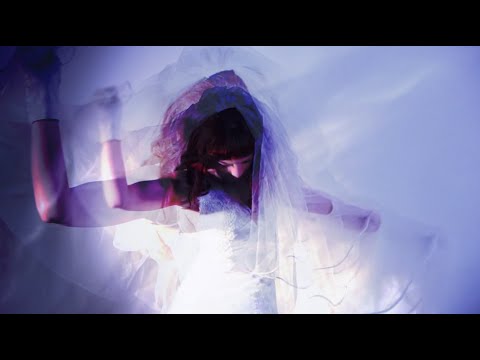The Anchoress, aka singer-songwriter Catherine AD, aka academic, occasional touring-member of Simple Minds and author Catherine Anne Davies, is really into misdirection. On her debut album, the rich and satisfyingly poptastic Confessions Of A Romance Novelist, she builds identity upon identity.
It’s partly a concept record narrated by the titular potboiler author, partly a series of imaginary character pieces, and partly a deeply personal outpouring from someone who’s been through a fair amount of personal hell. “Shit happened that stopped the record being made,” she says. “Shit happened that meant a different record was made. Shit happened that meant I couldn’t do anything, more shit happened that meant I probably shouldn’t have been doing anything, and then shit kept happening and I just thought ‘we may as well work through the shit’ so as not to feel like everything was… shit.”
Co-produced with former Mansun frontman Paul Draper, Confessions… was made during a period of Davies’ life in which she lost her father to a brain tumour and suffered a career-threatening wrist injury. All of that considered, and despite its title (or maybe informed by it – Davies loves playing with language) the album is no straight confessional. A life-long fan of Kate Bush and the Manic Street Preachers, Davies buries layers of story and meaning into her work, merging truth and fiction and leaving the listener to unpick her secrets.
I was fascinated with the whole idea of artistry and artifice in the record, of creating a different version of yourself?
Catherine AD: That’s a very Queer idea. Coming from that cultural and academic background of Queerness, the idea that identity is constructed and built, and reflected from the things we’ve read and surround ourselves with, is such a normal idea to someone like me that it seems so obvious it’s not even unusual. Of course we’re all constructed versions of ourselves.
Which is why you’ve made a record full of hidden meaning and symbolism rather that straight confession?
CAD: I wanted something rich that you could mine for sources and inspirations. The Anchoress, the Anchorite, was a female religious hermit who lived in a small annex in the side of a church, with a single window through which food and water would be passed, as she passed out her spiritual missives. So you’ve got this contracted space, the confined box of the recording studio in which I’m living. To represent that confinement I have to show that physically, hence the contortionist pose on the cover and the Miss Havisham-esque wedding dress. It’s all got meaning. It’s also supposed to be partly a homage to the pre-Raphaelite era as well, with the headdress. If you got through the reading list I put in with the CD, there’s lots of messages and in-jokes. That’s why I go back to Manics records, the more you read the more you discover new things in them.
I like the levels of personality in the record. A character that splinters off and creates their own characters.
CAD: A lot of people have taken that quite seriously as ‘there are 12 characters on the record, she’s speaking through 12 characters’. If you know me you know that’s not entirely true. In some ways it’s an incredibly personal, autobiographical record, there are fragments and elements of myself shattered within all of those characters. It’s all an elaborate parlour game, obscuring my own confessions within those songs. You’ll never entirely be able to separate what is fact and what is fiction. I feel comfortable with that, as someone who doesn’t like to reveal too much of themselves, it’s a way of saying exactly what I want, and you not knowing whether that’s about my life or someone else’s. I also think we do all have multiplicities of personalities. I feel I can be different people to different times and contexts. Like Whitman said, “I contain multitudes…”.
Do you think listeners can see through the artifice?
CAD: I guess because I’ve created this framework it allows people to believe it’s something else, which is convenient as a narrative. I think unless you’re an idiot you get that. Everything you make is incredibly personal. The whole thing is a joke and a riff on the idea of the confession, but I’m not going to tell you which elements are autobiographical – where’s the fun in that? They’re not 12 characters I conjured out of my arse. The key is in the title track, where I sing "you don’t know me”. I’m constantly throwing out misdirections all the time. I do that in real life as well. It’s very rare you can feel comfortable enough with people to feel entirely exposed and intimate with them. Why on earth would I do that on a record?
I’m an incredibly camp person, so I will always put quotation marks around things, I’ll always frame my most intimate moments within a reference to something else. When my Dad was dying I was making horrible, dark jokes because that’s who I am as a person. It’s a personal and intimate record, but you have to look for that through the lens of this very funny, dark humour that’s very personal to me. Perhaps it was framed too simply for people. It’s fragments. It’s a shattered persona, and there’s a prism through which those fractured elements are refracted across the record. If I was to make a record like Joni Mitchell’s Blue that wouldn’t be very honest, because that’s not how I present myself. That’s not who I am.
So you’re not interested in direct lyrics? “I didn’t mean to hurt you/ I’m sorry that I made you cry…”?
CAD: I’m not a direct person with anyone, it always involves being refracted through something else. That’s the thing with the title, Confessions of a Romance Novelist – is it a confession, or is it not? The implication being that it’s a very open exchange of conversation, where as we all know the best way to hook people in is to make them feel like you’re being incredibly confessional when in fact you’re holding back. Which is probably quite sad really.
The performance of intimacy. I wanted to play with that idea. There’s elements of real intimacy, but even that’s a performance. You can tell a lot about a person from their choice of PhD topic, and mine was about queer identities in homosexual epic poems. What does that say about me? Without being too glib about it, I’m interested in what it feels like to be marginalised, what it feels like to be an outsider, what it feels like to seize authorial power. Life is boring. Most people are boring. If you’re presented with something you can unravel, that you can make a puzzle out of, that’s really fascinating. Back to the idea of the straight confession, what’s so interesting about that? I want to be the librarian, allegorically speaking, working out where the books go and what has been taken out previously.
But then you also use a lot of lyrical clichés as hooks? “One for sorry, two for joy”, “what goes around comes around”, “what doesn’t kill you makes you stronger”, that’s being direct, isn’t it?
CAD: Well-worn clichés can sometimes lose their potency but it doesn’t make them any less true. But “that which doesn’t kill us, makes you stronger”? There’s nothing clichéd about Nietzsche, is there? The average person doesn’t always know that’s where it’s from. That’s the most personal song on the record, the idea of a character is thrown out of the window at that point. One of my friends listened to it and said, "you do know that people will actually listen to that?” but if you don’t know, then you don’t realise. It’s the art of misdirection. Maybe that comes from my obsession with the history of homosexuality, the idea of how the best literature was written by those who had to obscure their true identities. When you can’t be direct about what you want to express you have to evolve ever more fascinating, clever and skilful ways of expressing yourself. That’s why the best poets are gay men. What doesn’t kill you makes you a fucking better poet.
All of this is starting to make the album sound like it’s going to be some heavy, difficult approach but it’s actually… …actually it’s a pop confection?
CAD: I learnt that from the Manics, if you’re going to have a philosophical musing on existentialism, dress it up in a fucking great rock riff. No-one wants to be force-fed a philosophy, you have to make it palatable. The album is a treatise on queer identity masquerading as a pop record. For me it’s an intellectual challenge. Writing pop songs is really fucking difficult. You find me someone from a shit shoegaze band and get them to write a Katy Perry song? They’ll struggle. I think pop music is the pinnacle of 20th century art. It sounds like an awful thing to say, but I was really good at everything at school, so I wanted to do something I wasn’t good at. And I wasn’t good at writing songs. I was shit at that. Learning how to craft a pop song was an intellectual challenge, as much so as the lyrical content. I’ve done lo-fi singer-songwriting now, it’s relatively easy… writing songs as good as Abba? That’s fucking difficult. Not that I’m saying mine are. But you have to aim high. I don’t think I’ll ever be that good, but it’s about trying. Maybe next year I’ll decide to take up tennis.
The album, Confessions of a Romance Novelist is out now via Kscope. The new single, ‘Doesn’t Kill You’, will be released on June 17th. Catch The Anchoress band live at the below dates
The Anchoress UK Tour Dates
May
13th – Focus Wales, Wrexham
20th – The Great Escape, Brighton
29th – Sound City, Liverpool
June
15th – Bush Hall, London
July
15th – Latitude Festival, Southwold
August
5th – CCA, Glasgow
6th – Summer Hall, Edinburgh (with Kathryn Joseph)



